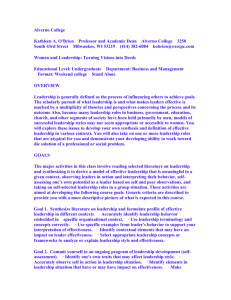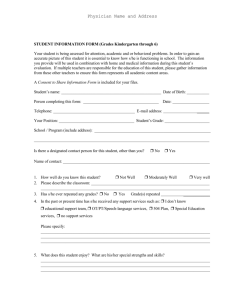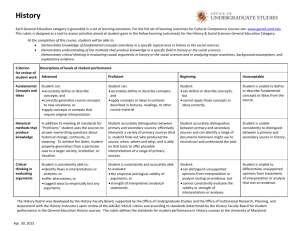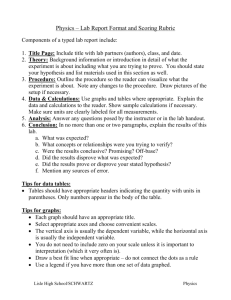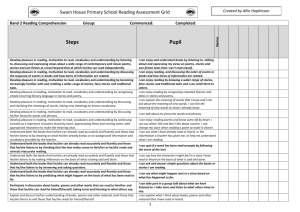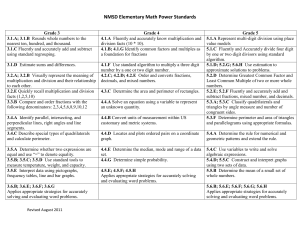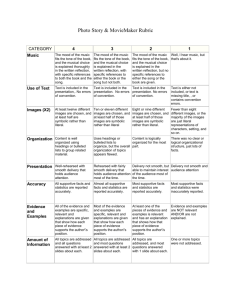File - rti-innovations
advertisement
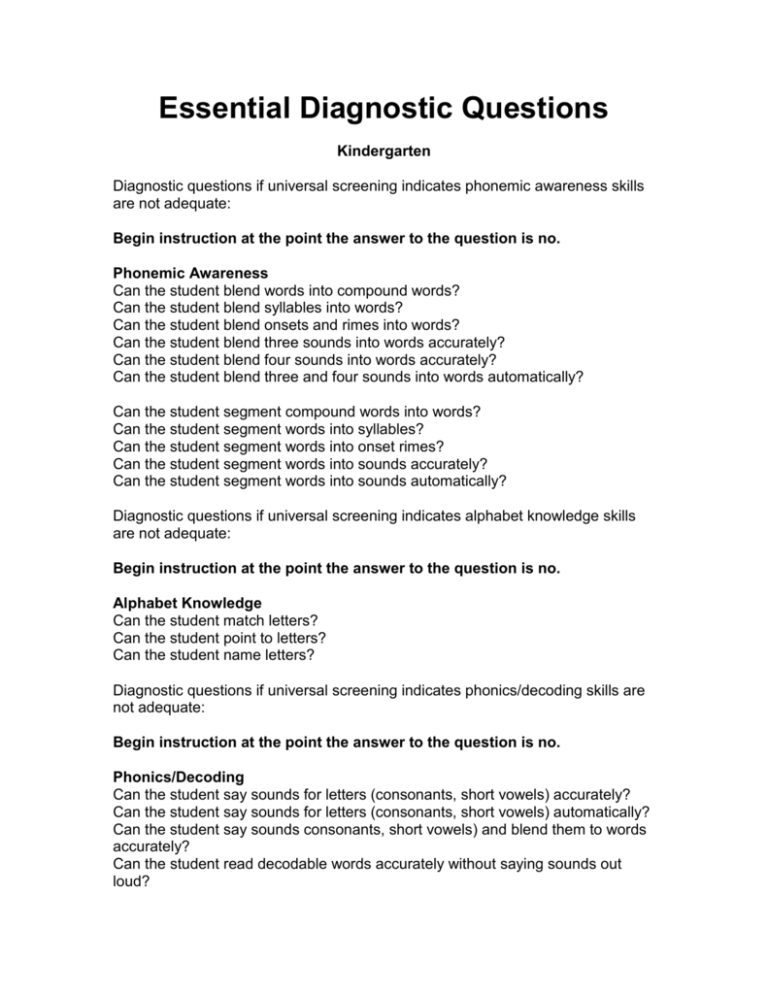
Essential Diagnostic Questions Kindergarten Diagnostic questions if universal screening indicates phonemic awareness skills are not adequate: Begin instruction at the point the answer to the question is no. Phonemic Awareness Can the student blend words into compound words? Can the student blend syllables into words? Can the student blend onsets and rimes into words? Can the student blend three sounds into words accurately? Can the student blend four sounds into words accurately? Can the student blend three and four sounds into words automatically? Can the student segment compound words into words? Can the student segment words into syllables? Can the student segment words into onset rimes? Can the student segment words into sounds accurately? Can the student segment words into sounds automatically? Diagnostic questions if universal screening indicates alphabet knowledge skills are not adequate: Begin instruction at the point the answer to the question is no. Alphabet Knowledge Can the student match letters? Can the student point to letters? Can the student name letters? Diagnostic questions if universal screening indicates phonics/decoding skills are not adequate: Begin instruction at the point the answer to the question is no. Phonics/Decoding Can the student say sounds for letters (consonants, short vowels) accurately? Can the student say sounds for letters (consonants, short vowels) automatically? Can the student say sounds consonants, short vowels) and blend them to words accurately? Can the student read decodable words accurately without saying sounds out loud? Can the student read decodable words automatically? Diagnostic questions if universal screening indicates irregular word reading skills are not adequate: Begin instruction at the point the answer to the question is no. Irregular Words (sight words) Can the student read irregular words accurately? Can the student read irregular words automatically? Diagnostic questions if screening indicates listening comprehension skills are not adequate: Begin instruction at the point the answer to the question is no. Listening Comprehension Can the student answer text dependent questions about the text accurately (character, setting, plot, conclusion)? Can the student retell what happened in the text accurately? First Grade Diagnostic questions if universal screening indicates phonemic awareness skills are not adequate: Begin instruction at the point the answer to the question is no. Phonemic Awareness Can the student blend words into compound words? Can the student blend syllables into words? Can the student blend onsets and rimes into words? Can the student blend three sounds into words accurately? Can the student blend four sounds into words accurately? Can the student blend three and four sounds into words automatically? Can the student segment compound words into words? Can the student segment words into syllables? Can the student segment words into onset rimes? Can the student segment words into sounds accurately? Can the student segment words into sounds automatically? Diagnostic questions if universal screening indicates alphabet knowledge skills are not adequate: Begin instruction at the point the answer to the question is no. Alphabet Knowledge Can the student match letters? Can the student point to letters? Can the student name letters? Diagnostic questions if universal screening indicates phonics/decoding skills are not adequate: Begin instruction at the point the answer to the question is no. Phonics/Decoding Can the student say sounds for letters (consonants, short vowels, digraphs, consonant blends, silent e) accurately? Can the student say sounds for letters (consonant, short vowels, digraphs, consonant blends, silent e) automatically? Can the student say sounds consonant, short vowels, digraphs, consonant blends, silent e) and blend them to words accurately? Can the student read decodable words accurately without saying sounds out loud? Can the student read decodable words automatically? Can the student apply decodable words in sentences? Diagnostic questions if universal screening indicates irregular word reading skills are not adequate: Begin instruction at the point the answer to the question is no. Irregular Words (sight words) Can the student read irregular words accurately? Can the student read irregular words automatically? Diagnostic questions if universal screening indicates accurate and fluent (automatic) reading of connected text is not adequate? Accuracy Can the student read accurately at the sentence level? Can the student read accurately in grade level connected text? Automaticity Can the student read automatically at the sentence level? Can the student read automatically In connected grade level text? Quality Can the student read with phrasing? Can the student read attending to ending punctuation? Can the student read connected text smoothly? Diagnostic questions if screening indicates listening comprehension skills are not adequate: Begin instruction at the point the answer to the question is no. Listening Comprehension Can the student answer text dependent questions about the text accurately (characters, setting, plot, resolution)? Can the student retell the text including all major story components Comprehension Can the student monitor for meaning (answer text dependent literal questions about the text)? Can the student use common text structures to assist in comprehension (story grammar for narrative/fiction; informational text structures for non-fiction (descriptive, enumerative, cause-effect, problem/solutions, compare/contrast)? Can the student use prior knowledge (answer text dependent evaluative questions about the text) to comprehend the text? Can the student retell the text including all major story components? Second Grade Universal screening questions: Can the student read grade level text accurately and automatically? Diagnostic questions if universal screening indicates students do not read grade level text accurately: Alphabetic Principle – Does the student know letter-sound correspondences expected for second grade (vowel teams, vowel + r combinations, ed, ing, s, ly)? Can the student read these sounds automatically? Can the student blend these sounds accurately to read words? Can the student read words accurately (without sounding them out loud)? Can the student read words automatically? Begin instruction at point where the answer to the question is no. Irregular Words – Can the student read irregular words accurately? Can the student read irregular words automatically? Begin instruction at point where the answer to the question is no. Accurate and fluent reading of connected text Can the student read grade level text accurately? Can the student decode words accurately in connected text? Can the student read irregular words accurately in connected text? If accurate, can the student read with sufficient automaticity to support meaning (use research-based automaticity level by grade and time of year)? Can the student read with phrasing? Can the student read attending to punctuation? Can the student read with appropriate prosody? Begin instruction at point where the answer to the question is no Comprehension Can the student monitor for meaning (answer text dependent questions)? Can the student use common text structures to assist in comprehension (story grammar for fiction, informational text structures – problem-solution, causeeffect)? Can the student use prior knowledge (answer text dependent evaluative questions)? Can the student make logical predictions about the text? Can the student ask clarifying questions about the text? Can the student retell the text? Can the student summarize the text? Third Grade Universal screening questions: Can the student read grade level text with accuracy and automaticity? If no, Diagnostic questions: Phonics Can the students read common prefixes and suffixes accurately? Can the student read common prefixes and suffixes accurately in words? Can the student read common prefixes and suffixes with automaticity in words? Can the student read 2-3 syllable words accurately in connected text? Begin instruction at point where the answer to the question is no. Accurate and fluent reading of connected text Can the student read grade level text accurately? Can the student decode words accurately in connected text? Can the student read irregular words accurately in connected text? If accurate, does the student read with sufficient rate to support meaning? Can the student read with phrasing? Can the student read attending to punctuation? Can the student read with expression? Begin instruction at point where the answer to the question is no Comprehension Can the student monitor for meaning (answer text dependent questions)? Can the student use common text structures to assist in comprehension (story grammar for fiction, informational text structures – problem-solution, causeeffect)? Can the student use prior knowledge (answer text dependent evaluative questions)? Can the student make logical predictions about the text? Can the student ask clarifying questions about the text? Can the student retell the text? Can the student summarize the text? Fourth Grade and Higher Universal screening questions: Can the student read grade level text with accuracy and automaticity? Diagnostic questions: Begin instruction at point where the answer to the question is no. Phonics Can the student read 3-5 syllable words accurately? If the student has difficulty applying vowel sounds in multisyllabic words, it may be necessary to check basic decoding skills in one-syllable words (vowels, vowel combinations, consonant blends) Can the student read 3-5 syllable words automatically? Can the student read 3-5 syllable words accurately in connected text? Can the student read 3-5 syllable words automatically in connected text? Begin instruction at point where the answer to the question is no. Accurate and fluent reading of connected text Can the student read grade level text accurately? Can the student read irregular words accurately in connected text? If accurate, does the student read with sufficient rate to support meaning? Can the student read with phrasing? Can the student read attending to punctuation? Can the student read with expression? Begin instruction at point where the answer to the question is no. Comprehension Can the student monitor for meaning (answer text dependent questions)? Can the student use common text structures to assist in comprehension (story grammar for fiction, informational text structures – problem-solution, causeeffect)? Can the student use prior knowledge (answer text dependent evaluative questions)? Can the student make logical predictions about the text? Can the student ask clarifying questions about the text? Can the student retell the text? Can the student summarize the text?
